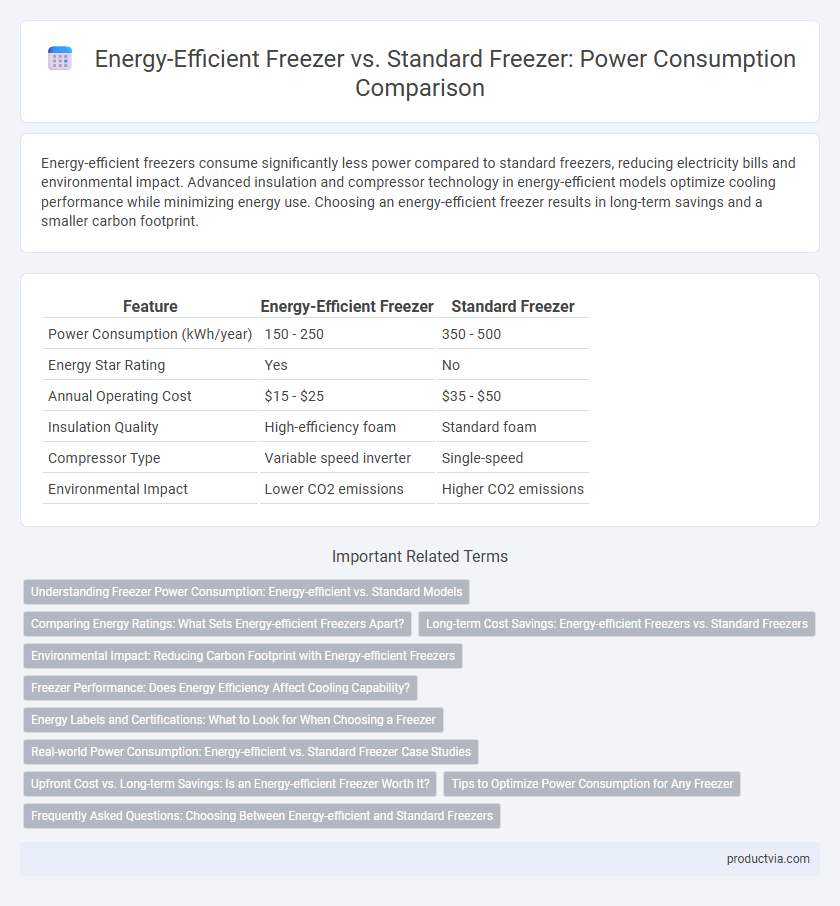Energy-efficient freezers consume significantly less power compared to standard freezers, reducing electricity bills and environmental impact. Advanced insulation and compressor technology in energy-efficient models optimize cooling performance while minimizing energy use. Choosing an energy-efficient freezer results in long-term savings and a smaller carbon footprint.
Table of Comparison
| Feature | Energy-Efficient Freezer | Standard Freezer |
|---|---|---|
| Power Consumption (kWh/year) | 150 - 250 | 350 - 500 |
| Energy Star Rating | Yes | No |
| Annual Operating Cost | $15 - $25 | $35 - $50 |
| Insulation Quality | High-efficiency foam | Standard foam |
| Compressor Type | Variable speed inverter | Single-speed |
| Environmental Impact | Lower CO2 emissions | Higher CO2 emissions |
Understanding Freezer Power Consumption: Energy-efficient vs. Standard Models
Energy-efficient freezers consume significantly less power than standard models by utilizing advanced insulation and compressor technologies that reduce energy waste. These appliances often feature Energy Star certification, indicating they use approximately 10-25% less electricity, translating to lower utility bills and decreased environmental impact. Understanding the wattage, insulation quality, and compressor efficiency helps consumers select a freezer that minimizes power consumption without compromising storage capacity.
Comparing Energy Ratings: What Sets Energy-efficient Freezers Apart?
Energy-efficient freezers typically hold an Energy Star rating, consuming up to 40% less electricity than standard freezers by utilizing advanced insulation materials and compressor technologies. These freezers incorporate improved temperature control systems and eco-friendly refrigerants, which significantly reduce power consumption while maintaining optimal freezing performance. The difference in energy ratings is primarily due to these innovations, translating to lower utility bills and a reduced carbon footprint over the freezer's operational lifespan.
Long-term Cost Savings: Energy-efficient Freezers vs. Standard Freezers
Energy-efficient freezers consume significantly less power than standard models, resulting in substantial long-term cost savings on electricity bills. Their advanced insulation and compressor technology reduce energy usage by up to 40%, lowering operational expenses over the appliance's lifespan. Investing in energy-efficient freezers also minimizes environmental impact while maintaining optimal food storage performance.
Environmental Impact: Reducing Carbon Footprint with Energy-efficient Freezers
Energy-efficient freezers consume significantly less electricity compared to standard models, leading to lower greenhouse gas emissions from power plants. These advanced appliances utilize improved insulation, variable speed compressors, and eco-friendly refrigerants to minimize environmental impact. Switching to energy-efficient freezers contributes directly to reducing household carbon footprints and supports global efforts to combat climate change.
Freezer Performance: Does Energy Efficiency Affect Cooling Capability?
Energy-efficient freezers utilize advanced insulation and compressor technology to maintain optimal cooling performance while reducing power consumption by up to 30% compared to standard freezers. These freezers achieve consistent temperature control and faster recovery times after door openings, ensuring food preservation quality remains uncompromised. Studies show that energy-efficient models deliver equivalent or superior cooling capability without sacrificing operational reliability.
Energy Labels and Certifications: What to Look for When Choosing a Freezer
Energy-efficient freezers often feature ENERGY STAR certification, signaling compliance with strict energy consumption standards that lower electricity usage by up to 15-40% compared to standard models. Labels such as the European Union's Energy Label provide ratings from A+++ to D, guiding consumers on power efficiency and helping reduce utility bills. When choosing a freezer, prioritize models with high-efficiency ratings, inverter compressors, and eco-friendly refrigerants to maximize energy savings and environmental benefits.
Real-world Power Consumption: Energy-efficient vs. Standard Freezer Case Studies
Energy-efficient freezers typically consume 30-50% less electricity compared to standard freezers, reducing annual power usage from around 500 kWh to approximately 250-350 kWh. Case studies reveal that advanced insulation, improved compressors, and smart defrost systems contribute to these savings, lowering household energy costs by $20-$60 per year. Real-world data from ENERGY STAR certified models confirm consistent performance under typical home conditions, validating their long-term energy and cost efficiency.
Upfront Cost vs. Long-term Savings: Is an Energy-efficient Freezer Worth It?
Energy-efficient freezers typically have higher upfront costs, ranging from 20% to 40% more than standard models, but they consume 30% to 50% less electricity annually, translating into significant long-term savings on utility bills. Over a 10-year lifespan, an energy-efficient freezer can save upwards of $300 to $500 in power costs, offsetting the initial investment. Choosing an Energy Star-certified freezer maximizes efficiency and reduces environmental impact, making it a cost-effective option despite the higher initial price.
Tips to Optimize Power Consumption for Any Freezer
Energy-efficient freezers use advanced insulation and compressors that reduce power consumption by up to 50% compared to standard freezers. To optimize energy use, maintain the freezer temperature between -18degC (0degF) and -15degC (5degF), avoid frequent door openings, and ensure proper airflow around the appliance. Regularly defrosting manual-defrost freezers and sealing door gaskets tightly also minimize energy waste across all freezer types.
Frequently Asked Questions: Choosing Between Energy-efficient and Standard Freezers
Energy-efficient freezers typically consume 20-50% less power than standard freezers, significantly reducing electricity bills over time. These models use advanced insulation, adaptive compressors, and eco-friendly refrigerants to optimize energy use without compromising freezing performance. Choosing an energy-efficient freezer minimizes environmental impact and provides cost savings, especially in households with continuous freezer operation.
Energy-efficient freezer vs Standard freezer for power consumption Infographic

 productvia.com
productvia.com